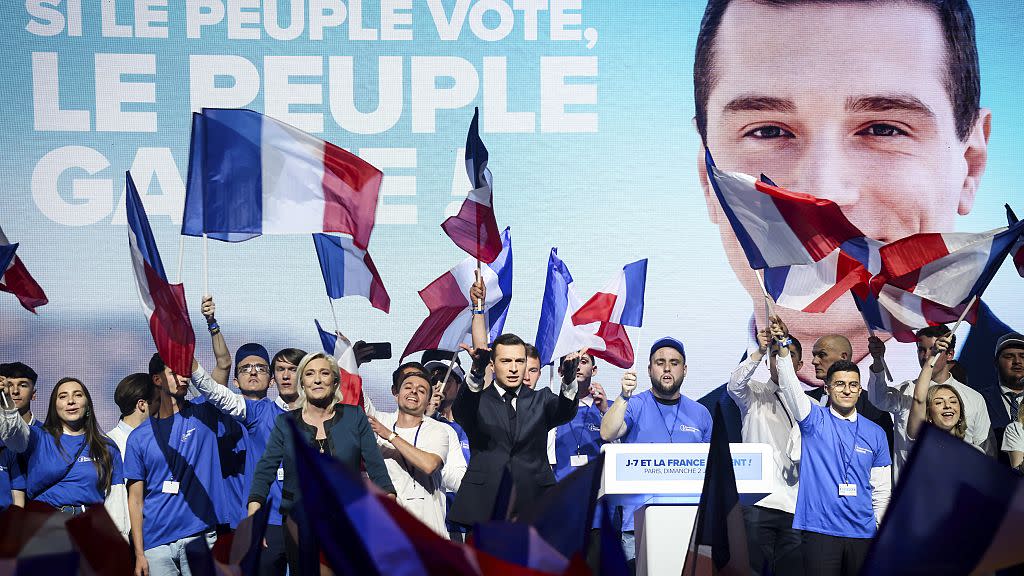Far-right, including France’s National Rally, use AI to support political messaging, reports say

European far-right parties have used artificial intelligence (AI)-generated images to support political messaging, two new reports have found, but it is difficult to assess how those images may have impacted the recent French and European elections.
Non-profit organisation AI Forensics went through the social media pages of 31 French political parties to determine whether they could spot generative AI (genAI) content from May 1 to June 28, during the EU elections and the first round of France’s legislative campaign.
They then put those images through AI-related search engines to verify that an AI tool created them.
In total, the team uncovered 51 instances of generative AI images used by French parties, with the far-right National Rally (RN), Reconquête and Les Patriotes being the most implicated, yet researchers said it’s a conservative estimate.
“This is the first election cycle where (generative) AI is a thing but we’re sure in the coming years that it will be used more and more,” Salvatore Romano, a researcher from AI Forensics, told Euronews Next.
“If we’re not able to manage this now when the scale is so small … it will be harder to manage when the technology is indistinguishable from real content,” he added.
The far-right RN came out on top in France’s first round of elections last Sunday with 33 per cent of the vote and in June’s EU elections, where they received 31.5 per cent of the vote.
Where the AI content appeared
Most of the AI-generated campaign images used by French parties “convey messages of anti-immigration, lack of safety in France, lack of freedom of expression, a flawed justice system, and poor agricultural protections,” the AI Forensics report found.
“[The images] are used as a fear-mongering technique to say that France isn’t safe in the EU, and that very much preys on vulnerable people in our society,” AI Forensics researcher Miazia Schüler added.
These images often looked “hyperrealistic,” where the average user could clearly see that it was rendered by AI, Schüler said.
Others were subtle, like imitations of political caricatures found in newspapers.
Some parties, like the far-right Reconquête, also used generative AI to create images of French President Emmanuel Macron and European Commission chief Ursula Von Der Leyen.
During the EU campaign, the RN created a website called “Europe without them” in the leadup to the elections that similarly challenged the leadership positions of Macron and Von Der Leyen, according to a study by the Atlantic Council’s Digital Forensic Research Lab (DFRLabs).
The website, still up and running, has at least three AI-generated images: showing petitions against the “EU’s contempt for peoples, massive immigration and promotion of the hijab,” their report found.
‘Just the tip of the iceberg’
Atlantic Council researcher Valentin Chatelet said it’s “difficult” to know how much impact this type of AI-generated content had on the RN’s success in both the EU and French elections.
“I think it is positively impacting the materials that the party is using to convey a particular idea, like Bardella’s particular stance on an issue,” Chatelet said.
“(AI-generated) images are also used to shock people … until they become mainstream,” he added.
Euronews Next reached out to the National Rally (RN), Identity and Democracy group, the Patriots and Reconquête political parties but did not receive a response.
French left and centrist parties unite to block far-right National Rally
How will France's far-right National Rally impact Brussels? | Radio Schuman
RN candidates have had AI training, including how to use ChatGPT since January 2024, according to French broadcaster BFMTV. In their training booklet, it gives examples of how AI can help political candidates, like creating campaign posters and finding arguments for debates, the broadcaster reported.
Neither AI Forensics’ study nor the Atlantic Council’s DFRLabs looked into the personal posts of candidates nor the content created by party fanbases.
Romano believes their study is “just the tip of the iceberg” for how much unlabelled AI election content is circulating on social media platforms.
‘Critical negligence’ by tech companies on AI use
The AI Forensics report found none of the AI-generated images were labelled as such.
“Our findings reveal critical negligence on both sides of political parties and platforms to adhere to the commitments of labelling AI-generated imagery in their political campaigns, highlighting the urgent need for transparency,” the report reads.
Big Tech companies like Google, OpenAI, Meta and TikTok signed an open tech accord in February that “set expectations for how signatories will manage .. deceptive AI election content,” on their platforms before the European elections.
The first commitment of this accord is that platforms will “(identify) realistic AI-generated images and/or (certify) the authenticity of content and its origin,” a copy of the accord reads.
Brussels asks Big Tech to counter threats to integrity of European elections
YouTube and X failed to act on disinformation ahead of EU vote - report
They also promised to review their models to “understand the risks they may present” for deceptive AI content.
Some political parties signed their own version of this agreement with the European Commission, which said they are “committed to preventing the deliberate deception of the public, including through the use of artificial intelligence,” a copy of it reads.
The European Parliament's Identity and Democracy group (ID) signed this code of conduct, of which the RN is a member. The other French national parties did not.
Romano said AI Forensics will be sending their report to the European Commission with the hope that there will be some sort of repercussion against parties for breaching these codes of conduct.


